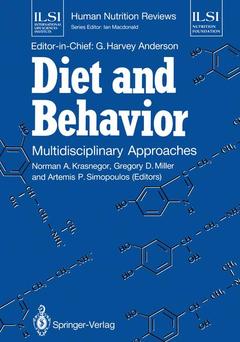Diet and Behavior, Softcover reprint of the original 1st ed. 1990 Multidisciplinary Approaches ILSI Human Nutrition Reviews Series
Langue : Anglais
Coordonnateurs : Krasnegor Norman A., Miller Gregory D., Simopoulos Artemis P.
Rédacteur en Chef : Anderson G. Harvey

This book focuses on the methodologies required to evaluate connections between diet and behavior. It is based on the premise that knowledge of the links between diet and behavior can be advanced only if appropriate methods are used, studies are vigorously designed, and data are carefully interpreted. This conceptual framework shows basic scientists just how essential multidisciplinary interaction is for the successful development of research methods and standards.
List of Contributors.- Section I. Origins of Food Preference.- 1. Conceptual Models.- Sensory Model.- Belief Model.- Ecological Model.- Food Perception Model.- Conceptual Models.- Summary.- 2. Cultural Determinants of Food Selection and Behavior.- Understanding Culture and Its Relationship to Diet.- Some Qualitative Cultural Approaches.- Biological Need, Adaptation and Behavior.- Models.- Biocultural Models.- Research Strategies.- Defining Cultural Variables.- Multidisciplinary Approaches.- Conclusions.- 3. Biological Determinants of Food Preferences in Humans.- Species-Typical Sensory Responses.- Genetic Influences on Individual Differences.- Need States, Metabolism, and Food Preferences and Aversions.- Neurotransmitters, Neuromodulators and Food Preferences.- Norepinephrine and Serotonin.- Endogenous Opiates.- Conclusion.- Discussion.- Section II. Measuring Behavioral Response.- 4. Behavior: Its Definition and Measurement in Relation to Dietary Intake.- Types of Independent Variables Most Typically Used.- Measurement Approaches.- Observational Methods.- Verbal Reports.- Research Designs.- The Controlled Laboratory Experiment.- Correlational Studies.- Typical Dependent Variables.- Examples of Measures for Assessing Dietary Manipulations.- Conclusions.- 5. The Use of Animal Models to Study Effects of Nutrition on Behavior.- The Role of Animal Models in Science.- Uses of Animals in Science.- Advantages of Animal Models.- Science as an Interactive System.- Interactions Within the System.- Value of All Components of the Scientific System.- The Paradox of Animal Models.- Limitations of Animal Models.- Relative Vulnerability.- Simplicity.- Sensitivity.- Choice of Behavioral Measure.- Choice of Animal Model.- Conclusions.- 6. Behavioral Procedures for Assessing Effects of Biological Variables: Implications for Nutrition Research.- Nutrition, Learning and Behavior Problems of Children.- Traditional Measures Used in Diet and Behavior Research.- Processes that Influence Performance.- Methods for Measuring Short-Term Memory and Attention.- Delayed Matching-to-Sample.- Sequence Reproduction Procedures.- Repeated Acquisition Procedures.- Use of Repeated Acquisition Procedures to Assess Biological Variables.- Use of Repeated Acquisition Procedures to Assess Learning-Disabled People.- Use of Repeated Acquisition Procedures to Assess Retardation and Dementia.- Advantages of Laboratory Tasks to Assess Learning.- Validity and Generality of Laboratory Measures of Learning.- Discussion.- General Requirements of Methods.- Effects of Diet on Behavior.- Nutritional Effects.- Pharmacologic Effects.- Psychologic Effects.- Effects of Behavior on Diet.- Conclusions.- On Learning.- Appendix. Nutritional Aspects of Diet and Behavior Studies of Animals.- Energy Intake.- Defined Diets and Replication of Experiments.- Other Dietary Considerations.- Conclusions.- Section III. Epidemiologic Studies.- 7. Nutritional Influences on Childhood Behavior: the Epidemiologic Approach.- Observational Methods.- Experimental Studies.- An Example: Food Additives and Childhood Hyperactivity.- Conclusion.- 8. Principles of Behavioral Epidemiology.- Epidemiology Methodology.- Cohort Studies.- Case-Control Studies.- Establishing Cause.- Reliability and Validity.- Behavior Science Methodology.- Behavioral Epidemiology Research Studies.- National Health Interview Survey: Child Health Supplement.- National Longitudinal Survey of Youth.- Defective Infant Formula Study.- Behavioral Outcome Measures.- Summary and Conclusions.- 9. Identifying the Genetic Component of Dietary — Behavioral Interactions: A Challenge for Genetic Epidemiology.- Preamble.- A Conceptual Paradigm.- Negative Feedback Loops: Beneficial Effects.- Positive Feedback Loops: Detrimental Effects.- More Complex Models: The Example of Obesity.- Consequences of Feedback Loops.- Measurement Issues: Defining Intermediate Phenotypes.- Study Design and Analytic Strategies.- Exploratory Analyses.- Association with Genetic Markers: A Direct Strategy.- Familial Aggregation: Indirect Strategy.- Adoption Studies and Twin Studies: Studies Involving a Single Contrast.- Fixed Clusters: Partitioning Genetic and Environmental Effects.- Testing Explicit Hypotheses: Segregation, Linkage and Regressive Analyses.- Prospectus.- Discussion.- Section IV. Integration of Research Methods in Diet and Behavior.- 10. Methodologic Considerations for Diet and Behavior Studies: A Nutritionist’s Perspective.- Experimental Approaches.- Physiologic Psychology.- Behavioral Sciences.- Methodologic Considerations.- Sample Size Calculations.- Quantification of Diet.- Use of Food Composition Tables.- Range of Nutrient Intakes.- Acute vs. Chronic Studies.- Blending of the Disciplines: Collaboration not Duplication.- Conclusions.- 11. A Behavioral Scientist’s Perspectives on the Study of Diet and Behavior.- Animal Studies.- Human Studies.- Laboratory Studies.- Selection of Subjects.- Test Foods and Drinks.- Measuring Food Intake and Eating Behavior.- Subjective Assessments.- Conclusions.- Discussion: Implications for Future Research.- Looking to the Future.- The Challenges and Problems of Multidisciplinary Interactions.- The Needs for New Methods in Diet and Behavior.- The Need for Additional Animal Models.- New Models in Human Behavior.- Summary.
Date de parution : 05-2012
Ouvrage de 234 p.
17x24.2 cm
Disponible chez l'éditeur (délai d'approvisionnement : 15 jours).
Prix indicatif 52,74 €
Ajouter au panier
© 2024 LAVOISIER S.A.S.



